*Note this only covers the first six seasons, it doesn’t (necessarily) address the reboot in season 7
Once Upon a Time is a rather fascinating study. It is imminently appealing and incredibly flawed at the same time. Which means, in many ways, it’s the epitome of a show you love to hate. Or perhaps more accurately, hate to love.
It presents itself as a modern version of fairy tales, which is a lot of the appeal. But it mishandles and even betrays so much of those stories in so many ways.
- There’s a lightness to the storytelling that makes it fun. And also prevents it from moving below the surface to become compelling. (The casting in many places doesn’t help with the lack of depth.)
- It’s got costumes and elaborately digitized “sets” that create a fantasy world with what quickly becomes an incoherent timeline.
- It uses the names and pseudo story structures of many well known (and Disneyfied because it’s ABC) fairy tales and we love a new take on an old favorite. But it betrays so much of those characters and what made us love them in the first place.
It’s not terrible to rewatch if you can overlook the inconsistencies and flaws. And it will always get credit for turning Colin O’Donoghue into a pirate.
But the more you watch, the harder it becomes to ignore that as a modern version of fairy tales, it really doesn’t measure up. We can criticize it (which is easy enough). Or we can learn from its missteps and tell better stories ourselves. Lesson the first:
Don’t Corrupt Your Characters
When you decide to play in a fairy tale world, you’re accepting certain limitations off the bat. First, your characters have been established, multiple ways by multiple other storytellers and you have no control over that. Or the perceptions the audience is going to bring to your story. Or that the Disney version will undoubtedly affect how your audience approaches your story.
Because this is a retelling, we don’t want you to retread everything we already know. We want you to take everything we love and make it new – the story we love with a new flavor of adventure or a different shade of wonder. Make it exciting and fresh and slightly familiar all at once.
But in the effort to do something new, the worst thing you can do is corrupt the character you’re working with.
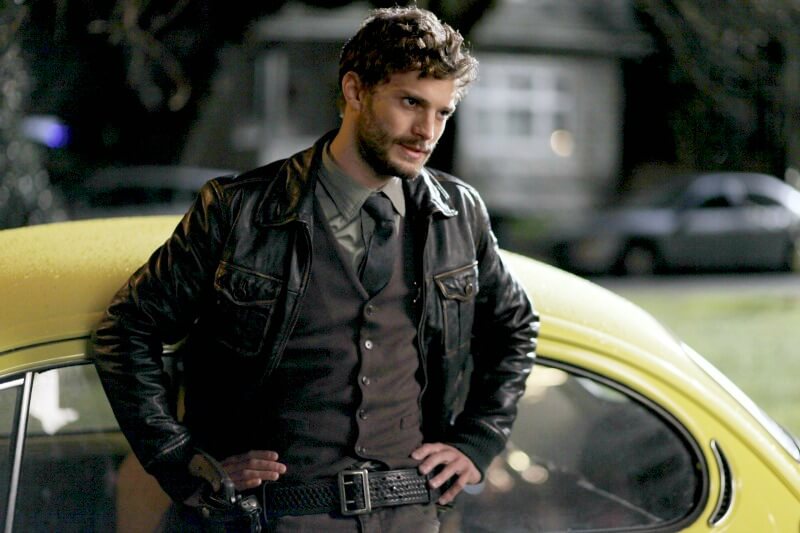
The creators of Once Upon a Time had a clever idea. But Disney entrusted their properties to writers with a superficial understanding of fairy tales. Kitsis and Horowitz think, quite incorrectly, that being a fairy tale heroine means being saved by the hero. That these characters aren’t strong, interesting, bold and smart in their earlier incarnations.
So, apart from Snow White, they omit a lot of the strength and virtue the characters bring to the table. They can’t seem to turn the story in interesting ways without betraying the characters. (spoilers abound ahead)
- Jasmine goes from a fierce, defiant girl to a defeated princess.
- King Arthur (you can call him “King Arthur” all you want but he isn’t really, is he?) goes from being a beacon of nobility and honor to being a selfish fool.
- Cinderella makes a deal with the villain for the sake of revenge.
- But her prince likes her because she is soft and timid and sweet. It plays into the worst ideas of the character and completely ignores her virtue and her strength.
The underlying problem is that Kitsis and Horowitz put the need for conflict above the character integrity (and also above the importance of a coherent timeline but that’s another matter). I get it, it’s tv. You need fresh conflict every episode, week after week. But good writers won’t sacrifice their characters for the sake of contrived conflict.
Plot, yes, roll that upside down and inside out. Choices the characters make, sure play with those as long as it’s logical and consistent with the characters. If it’s out of character then don’t do it. At that point, it’s not a clever twist on the character, it’s not really the character at all. And establishing that balance requires knowing the character you’re working with.
Because it isn’t any fun watching the wreckage of characters you love. And (personally) beyond the storytelling choices, I really didn’t like a lot of the casting choices. The single theme threaded through the 5 lessons series is that casting matters. It’s either going to make or break your show and I felt that it broke a lot of Once Upon a Time.
If you’re going to dance in a fairy tale world, you need to know the steps. Whether you follow them or defy them, know what you’re doing enough to still enthrall the audience, to be true to the characters and make it clever and interesting (or at the very least fun!).
Passive Empowered Heroines
It’s an oxymoron, right? How can their heroines be both passive and empowered at the same time? Easy, they talk a good game about being strong and say, “No one saves me but me.”
And then they make choices that undermine their intelligence and capability.
- They feel weak and helpless and make a deal with Rumpelstiltskin. Because if she can’t have the hero save her then she might as well have the villain at least get her out of this mess.
- They utter the 4 worst words in any story. “I had no choice!” is not the mantra of an empowered heroine (and, seriously, one character or another says that every. single. episode.)
- They blame someone else for their choices (their mothers quite often or the bad guys or the good guys or anyone else).
Being empowered doesn’t mean you can pick a lock or face down an ogre. It means having the agency to effect your own destiny, making choices that shape the world around you and the story. Therefore, OWN those choices.
It’s rooted in the same problem as the corrupted characters. Kitsis and Horowitz prioritized the need for conflict above all else.
Which (again) creates a contrasting dichotomy in this series – smart, bold, often capable heroines that put themselves into positions of weakness or passivity. Which is bad enough in any story. But worse when it’s stories we know and characters we love but barely recognize.
Negative Control
This likely isn’t a term many are familiar with, but Once Upon a Time is rife with negative control. You see it every time a character makes a choice for someone else because “it’s for your own good.” But really because they don’t trust that other person to make the choice themselves. Because they don’t respect the other character enough to think they can actually make their own choices. And because they need to be in control of the situation and the other character.
Sometimes it’s acknowledged. Usually by Belle when Rumpelstiltskin is controlling her. He’s the villain, that sort of negative control is part of his evil-ness. It’s part of Regina’s Evil Queen traits. And it’s also a consistent part of the Charming family. Snow controls David. David controls Snow. Emma controls everyone.
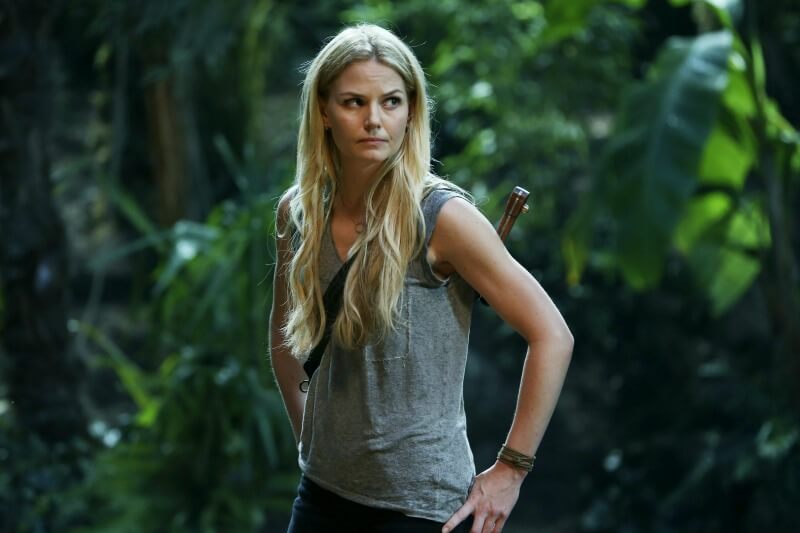
It’s the terrible crutch they use to drive the plot. And, to be quite frank, it’s a terrible unconscious message to feed the audience again and again over six seasons. That this is what loving someone looks like. Or that this is a healthy relationship because it’s a fairy tale and they’re the heroes. And it’s hard when you watch the episodes to not let that seep into your mind.
Living in tell instead of show
You know every writing advice anywhere will tell you “show, don’t tell”? Yeah, Once Upon a Time is an entire series built on telling.
And it makes the stories superficial. It makes the characters weak. And it keeps the audience from REALLY feeling the depth of what is possible.
Because, these actually are pretty cool ideas and could be powerful stories. Having to sacrifice the thing you love most? Splitting a heart in half? Curses and power and magic and true love. These are all pretty fantastic themes, the kind of stories that fairy tales are known for.
But Once Upon a Time only skirts the surface of them. They contain plots with sacrifice and pain and hope. But they never dwelt in those stories. They just talk about them again and again. The actors tried to feel the depth of what they were talking about but it only ever stayed at the level of talking about it.
Shows like Battlestar Galactica and Buffy, The Vampire Slayer were often poignant and storylines resonated. Which is interesting because several of the writers on Once Upon a Time also worked on both Battlestar and Buffy.
But on Once they only wrote the idea of an interesting story as if that would suffice without showing us the story they imagined.
And as a result, you don’t feel it. You might feel something. But it doesn’t grab your heart, suck the breath out of you and evoke tears you don’t realize are streaming down your face. The characters all did those things but the themes and stories they toyed with were only words.
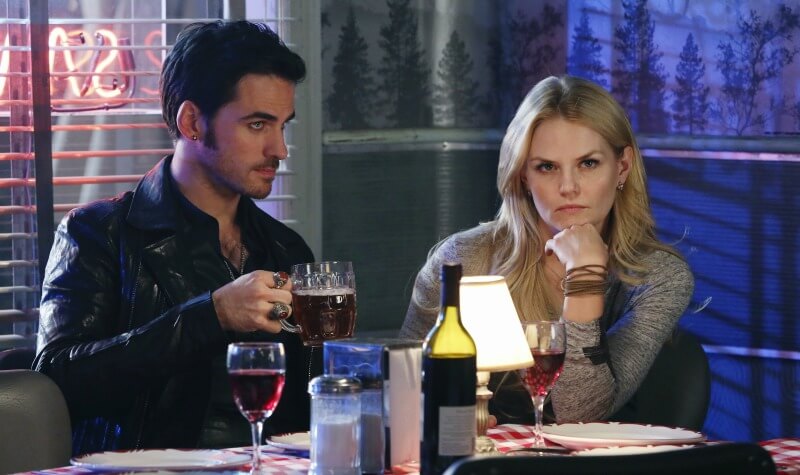
This is one of the lessons where perhaps you can’t recognize or correct it yourself. Because the story and the world and the characters live in your mind so when you read it, you bring context and emotion that perhaps you aren’t conveying to the reader. You need a good editor to help you spot where a story is weak.
Or it may be the sort of thing (perhaps like Once Upon a Time) where you’re leaning too heavily on the reader’s pre-existing connection to the characters and not taking the time to delve into your own story.
Either way, if you want the audience to feel something about what you’re saying, leverage editors and beta readers to make sure they’re actually feeling it and not just listening to the words you’re saying and moving on.
The Magic of Metaphor
One positive lesson is the beautiful way they took metaphor and made it tangible and real.
Hearts are these beautiful gems that can be ripped from our chests, cursed, crushed, broken in half and shared. The problem is that because they’re stone, they can’t be healed, repaired, restored.
Still, the way they handle hearts is powerful and beautiful and interesting.
This is a short lesson because there really is no how. Just the knowledge that if you can take a metaphor and make it real – make it literal and tangible – that can engage your reader in a powerful way. It can even create magic in your fantasy world.
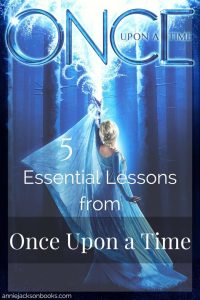
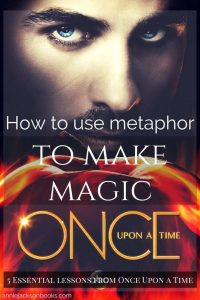
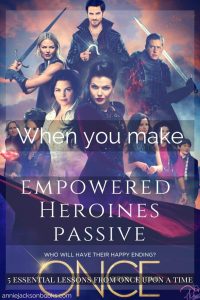
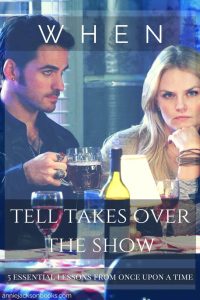
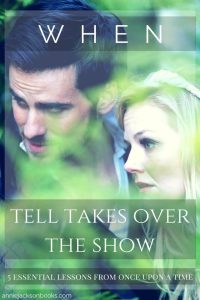
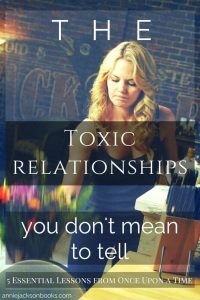
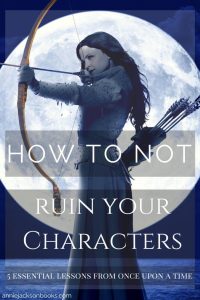
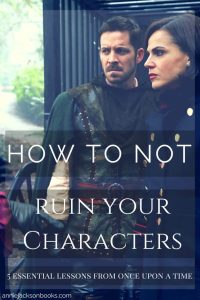
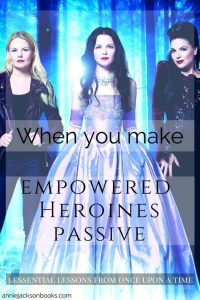
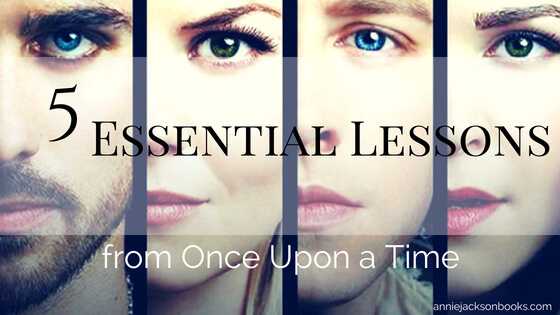
I’m so glad you published this article! I loved the series so much I even got my husband to watch with me. But then something happened, the characters became shallow to us and so characteristically inconsistent that we finally couldn’t watch anymore. Season after season led to disappointment over character development and their constant fluctuation in self conviction and personal growth. Ugh, so sad and you are able to clear it up neatly for me. Cheers! (From a closet writer. )
I know! It’s so awful when something you enjoy lets you down! I’m so glad you enjoyed the article (and keep writing!)
OMG. I’ve been saying this for years. You explained my thoughts about OUAT better than I could. Especially about the show-don’t-tell thing. They’re AWFUL about that! This is one of those shows that’s a guilty pleasure (I’m so glad it’s ending this year. It’s driving me batty), but I keep thinking, “They need to hire me! I’m a much better writer than them!”
I know!! 🙂 It’s totally a guilty pleasure but the more I watched it the less fun it became and the show don’t tell thing drove me CRAZY (I’m glad it’s ending this year too!). I have no doubt you’d have written it much better!
Thank you so much!! This perfectly illustrates the issues I had with OUAT. I love the show, or rather the idea behind the show, but what got to me was the negative control you mentioned. THANK YOU. I’m so tired of hearing “I did it for your own good!/I had no other choice!” … Great post!
Thank YOU!!! I’m so glad I’m not the only one who had a difficult relationship with this show because I really *wanted* to like it. And I’m very glad I’m not the only one who was bothered by the negative control “because i looove you” blegh!
This has got to be my favorite writing article! I completely agree with everything you said, and I had no idea anyone else had the same opinions! Everyone seems to love the show, and while I did enjoy some parts and characters, I had too many problems with it to go on.
I honestly stopped watching the show because if the character inconsistency from the original stories, so I’m really glad you brought that up! There was a specific character that I loved from the original story, and that story is still one of my favorite books of all time, but then OUAT made the character a villain for literally no reason other than a cheap twist. It was so inaccurate to the point of the story, I just couldn’t watch anymore.
I so glad! It’s such a difficult show because there were things to really like, but also really bothersome things that spoiled it. I’m glad I wasn’t the only one bothered by how they changed the characters! I’m curious, who was the character they turned into a villain? That would have driven me absolutely crazy and I think I’d have stopped watching too 🙁
It’s such a difficult show, being a good idea in theory with some good parts, but the writers neglected to fix some problems that ruin it. “King” Arthur was one of the characters that was spoiled, as was Peter Pan, but the one that made me stop watching was Dr. Jekyll (and I suppose Mr. Hyde, since they made him the good personality for some reason). I love that book and despite the way the show’s quality was dropping, I was excited to see that storyline, but I was just disappointed. Honestly, I feel like they just wanted to add a huge plot twist, but they didn’t care enough to try past their usual good-to-evil and evil-to-good switch.
I had a hard time with Peter Pan because I didn’t like what they did to the character, but I thought the actor they hired pulled it off *really* well. “King” Arthur was a total debacle. Dr. Jekyll ad Mr. Hyde was also totally warped. I think you’re right that they were going for a plot twist and fell back on the usual good/evil switch. But they had so little concern for character integrity overall it soured what was an interesting idea.
What gets me is that even running with the twist of Peter Pan being a villain, they still didn’t really pull it off all that well. Maybe the more compelling idea would have just been too dark for OUaT. Because we’re talking about a character who literally treats war like a game and says things like “I always forget about people after I kill them”. It would make more sense for a villainous Peter Pan to be an impulsive psycho who can’t tell right from wrong. Instead, they made him a conniving adult in the body of a teenager. Great.
One of the ones that really bothered me is their version of Jack. Not because they gender-swapped him. I could probably have run with the Jacqueline character. But because making him a villain is actually kind of an old, tired idea. There must be a million “What if Jack was the bad guy and the giant was good” concepts in books alone.
This artical is so beautifully written! I love any article where the author can string together words that resonate deeply and leave me smiling because they just nailed it.
And I feel like it was the lightbulb moment for why Once often seems to fall flat.
I loved the idea of the show at the start and aspects of some characters are still very dear to me, but I have to look past a lot of flaws to see the good – and so many of those flaws aren’t necessary! It comes down to what felt like very lazy writing at times, and maybe a bit too much ego due to the fan base. Having loyal fans doesn’t mean you can do whatever crazy scheme you want and they’ll follow without question, it means you have to keep them in mind and continue the characters and plot in a way that honours their trust while developing your story. (The show lost me after the creepy/gross Robin Hood+Zelena pregnancy plot was revealed and I haven’t been able to make myself go back, so if characters/storylines got better/worse after tgat I wouldn’t know.)
I also couldn’t help noticing the parallels between Once’s writers and Joss Whedon. My sisters and I used to admire him and his shows, but then we realised his “strong female characters” were only strong in that they could look good in a sleeveless shirt and didn’t need help carrying the groceries because they’re Strong Independent Women™. Once there was a situation that called for internal strength, emotional strength or firmness of character they were weak, emotional (but still not strong) people who needed the cocky guy to rescue them. It’s a stupid trope I try my very hardest to avoid when writing, but it’s still hard to keep a ballance between ‘normal human’ and ‘someone extraordinary enough to write about’.
Thanks for this great article! It clearly got me thinking! 🙂
I so glad you enjoyed it!! And even more that it got you thinking. I love those articles as well, when someone is able to articulate something that presents a different perspective or gets the gears of my mind turning in a new direction 🙂
I also really loved the idea of the show and, clearly, struggle with the fact that it never lived up to what I wanted it to be. You make such a great point about the ego that can develop from a strong fanbase. Just because lots of people love what you’re doing, and love it vocally, doesn’t mean what you’re doing is good. Or that it isn’t important to think about what you’re writing, perhaps even more carefully, to make sure it’s good writing!
Unfortunately, it just got worse after the Robin/Zelena debacle.
[…] 5 Essential Lessons from Once Upon A Time […]
Another thing I think was a problem was that the show never felt like it had any forward momentum. It was a show on a treadmill. Constantly moving and never getting anywhere.
Anyway, if people like the idea of Once but not the show, I’d like to suggest you check out the comic book series Fables or the children’s book series Sisters Grimm. They are, if not Once done right then at least Once done better. (Note: Fables is a comic for adults. So, don’t be surprised by some of the content).
Once reminded me of Sisters Grimm too ! (althought less cleverly done)
Thank you so much for this article !
One of the things that annoyed me about this show was Rumplestiltskin. Every season they hero’s would trust him to help but he would always betray them at the end and it just got annoying. You made some great points in your article!
Thanks! I found him incredibly annoying too! And I never understood why Belle like him at all.
I agree with so many things, both from the article and the comment section. But another thing that really bothered me was that it didn’t really seem like anything had a consequence. Sure, people would get upset at each other, but they would always forgive each other, no matter how bad the other had acted. And some characters did truly horrible things to each other. Like *SPOILER* when Selena posed as Robin’s dead ex-wife just to sexually assault him and get impregnated by him. And that made her and Regina get even closer. As if Regina and Robin’s relationship wasn’t messed up from the start, her killing his wife and all, just to turn around and make a family with her sister who assaulted her boyfriend multiple times.
And also the thing about true loves kiss. So many characters have loved each other for many, many years but their kiss does not count as true loves kiss because that would stop the storyline that the writers wanted. And then you have new, exiting characters that are just getting to know each other who suddenly have the power of true loves kiss. And Emma was said to be special because she was the product of true loves kiss, but almost every baby in the series is the product of true loves kiss, so that makes every baby special, even Belle and Rumples
Great point about the lack of consequences. I think you can redeem villainous characters but you have to earn it–and Once Upon a Time didn’t really. And true love… I thought several times that there were lots of people who were the product of true love, too! Emma definitely wasn’t as special as they made her out to be.
From what I remember Emma was only considered special enough to break the curse because Rumpelstiltskin used her parents hair to make it. But they weren’t every constant having Regina break it the second time when she didn’t technically cast it Snow did. Plus I never did understand why Emma had magic unless everyone had it without realizing it.
I somewhat agree with you. I hated that they made Snow somewhat selfish at the beginning of Season 4, it totally ruined her character. And I hated how Emma was always like, “I’m the Savior. It’s my job.” She’s a bit overrated in my opinion. And I never understood how they would trust Rumplestilkskin, but he’d betray them at every turn, and they would trust him again in the next season. But this TV show did make me cry, laugh, and feel sorry for the characters. So it’s not entirely bad, but your points made me rethink.
An INTERESTING and thought-provoking article!! It really made me re-evaluate the show I used to be obsessed with. You make valid points, it was a cheesy show that had its downsides. But I did learn some valuable lessons about courage/bravery and stuff like that.
Just a little side note about the writing style of this article that bugged me: the sentence structure in this article was very choppy and a little distracting… I had to re-read a lot of it because of all the periods. I had to restart my brain & thought process during every paragraph because of the choppy sentences.. it didn’t flow very well. its not a huge deal, it just took me a little longer to read and understand. Just something I noticed!
I’m so glad you enjoyed the article (apart from the writing style). It’s actually funny that you mention the style of this article as it’s a result of feedback on my natural style. My writing is typically filled with longer sentences and lots of semi-colons. In this article I tried to cut the long sentences down and provide succinct thoughts one at a time. I was not quite good at it at the time so it does make the style somewhat choppy.